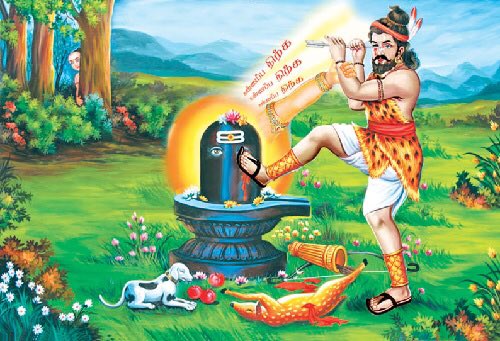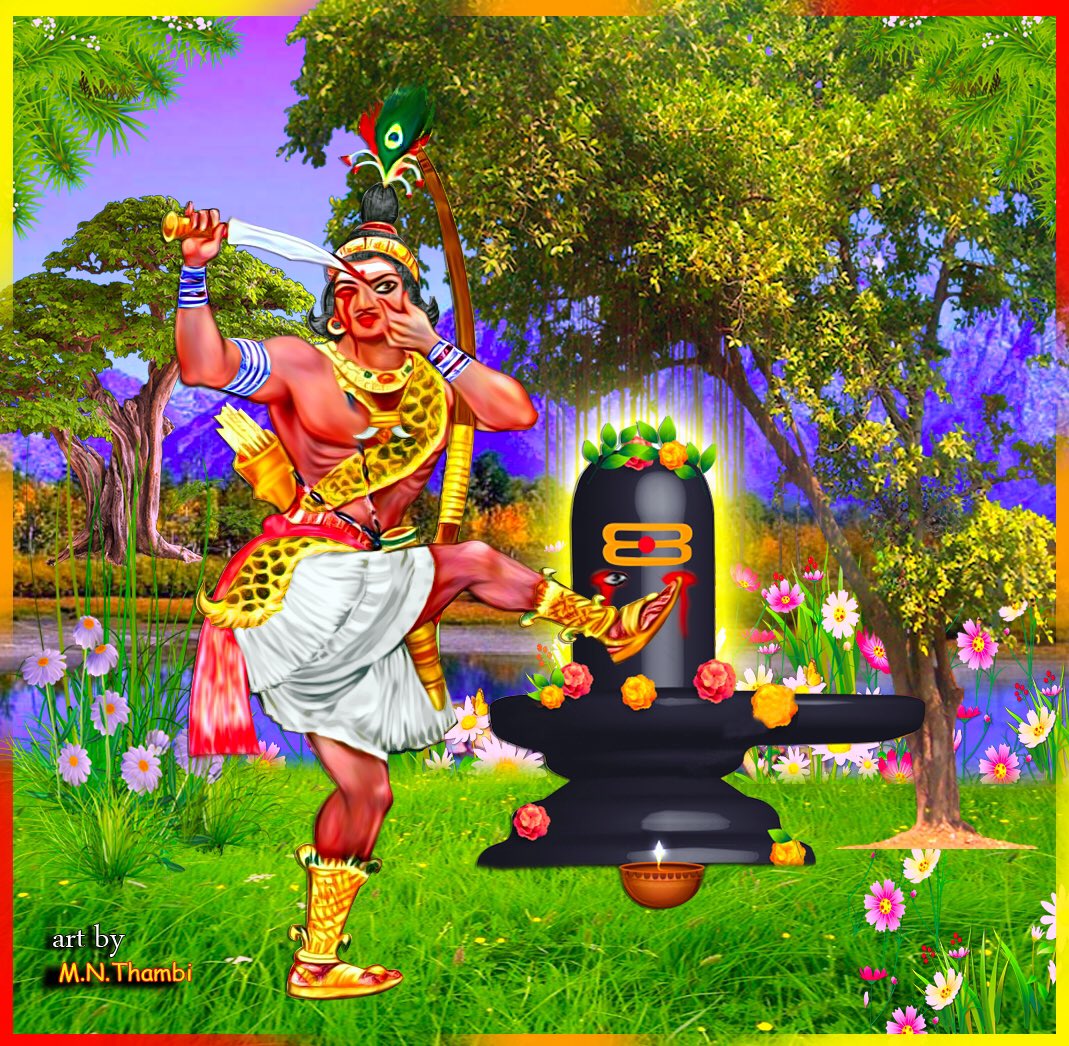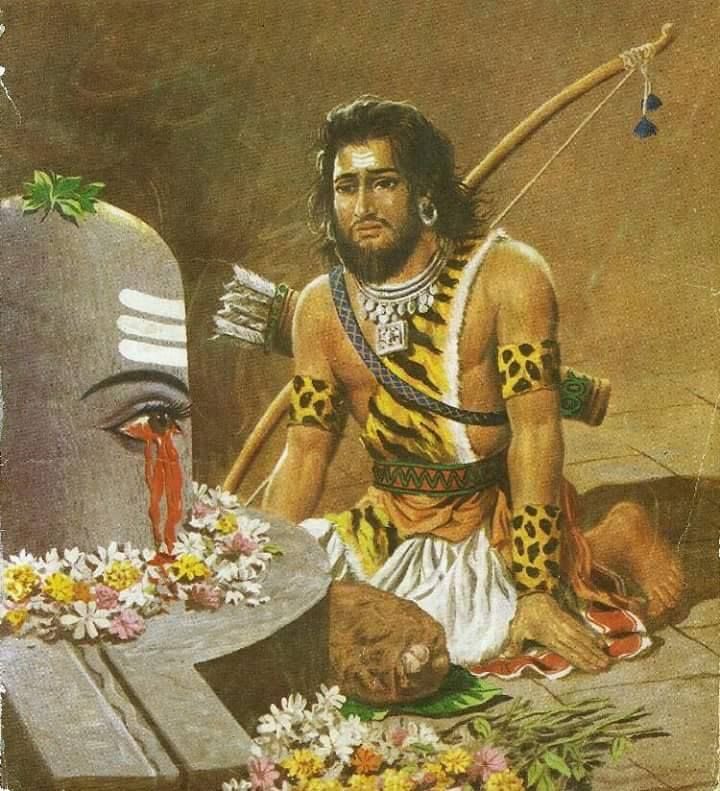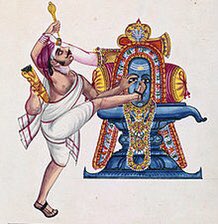Bhakti: Part 2 - Kannapa Nayanar- A Thread (1/)
मार्गावर्तितपादुका पशुपतेरङ्गस्य कूर्चायते
गण्डूषाम्बुनिषेचनं पुररिपोर्दिव्याभिषेकायते ।
किञ्चिद्भक्षितमांसशेषकबलं नव्योपहारायते
भक्तिः किं न करोत्यहो वनचरो भक्तावतंसायते ॥
- Śivānanda Lahari, Ādi Śaṅkarācārya, 63
मार्गावर्तितपादुका पशुपतेरङ्गस्य कूर्चायते
गण्डूषाम्बुनिषेचनं पुररिपोर्दिव्याभिषेकायते ।
किञ्चिद्भक्षितमांसशेषकबलं नव्योपहारायते
भक्तिः किं न करोत्यहो वनचरो भक्तावतंसायते ॥
- Śivānanda Lahari, Ādi Śaṅkarācārya, 63
The sandal pounded on by the road is the bundle of Kuśa grass for the body of Paśupati, the sprinkling of the mouthful of water is the divine bath for Śiva, partially eaten remnant meat is the fresh oblation. What can not devotion do (even such uncivilised acts)?
Oh how wonderful, the forest dweller (a Hunter devotee by name Kannapar), is the crest jewel of devotees !
Ādi Śaṅkarācārya immortalises the devotion of the great Kannapa in this verse. Kannappa Nayanar was a Tamil saint born in a Vyādha (Hunter) family. He is considered as one of the 63 Nayanars (holy Saivite saints). His birth name was Thinnan.
He was a staunch devotee of the Vayu Linga of the Srikalahasteeshwara Temple which he found in the forest while hunting. Being a hunter, he did not know how to properly worship Lord Shiva. He was unaware of the rituals for worship and so out of love offered his own meat.
A Brahmin, who regularly looked after the Linga, returned to the shrine the day after Thinnan had made his offerings, and was shocked to see meat lying next to the Linga, and so cleaned the area.
One day Thinnan plucked some flowers for his Lord and saved them in his hair, as he was carrying the hunted meat catch in both arms. Then he noticed a small stream flowing nearby and had an idea, “How nice it would be to give a bath to the Lord!”
He then bent and filled water into his mouth and went to the shrine where he spit the water from his mouth on the Linga, thus bathing the Lord. He happily made his offerings and spoke to the Lord before leaving for the day.
The next time the Brahmin returned to the shrine, the sight he saw repulsed him. There was meat all over the place again, and this time, the Shiva Linga was covered by spit. Knowing this to be a sacrilege of a human, he cleaned and purified the shrine.
But he saw the same thing every time he arrived there. Heartbroken, he could not control his tears and addressed Shiva aloud. In a dream, the Lord explained the hunter’s love, and told the Brahmin to observe the extent of the hunter’s devotion the next day, in secrecy.
The Brahmin hid himself behind some bushes. Thinnan came as usual carrying meat in his hands, flowers in his hair and water in his mouth. As usual Thinnan started his routine of bathing the Shiva Linga & offering what he brought to the Lord.
He noticed that there was blood oozing from the Lord’s left eye. He ran to collected herbs and applied them to the eye but the blood continued to flow. Finally, he decided that the only way he could solve the problem was by offering the Lord his own eye.
Taking one of his knives, he cut his left eye out of its socket, and placed it on the Linga. At once, the blood stopped oozing, and Thinnan heaved a sigh of relief. He started dancing around with joy. But, he noticed that the right eye of the linga has also started oozing blood.
So, Thinna thought that if he were to pluck his other eye too, he would become blind to exactly know the spot where he has to place his own second eye over the bleeding second eye of the lingam.
So he placed his great toe on the linga to mark the spot of the bleeding second eye and proceeded to pluck out his other and only eye. Moved by his extreme devotion, Lord Shiva appeared before Kannappa, stopped him from plucking his only eye and restored both his eyes.
The Brahmin too came out from hiding and bowed before the Lord. He made Thinna one of the Nayanmars and he was called as Kannappan or Kannappa Nayanar. Since he had given up his eyes (“kann” means “eye” in Tamil) for the Lord, he would henceforth be known as Kannappa Nayanar.
Sāmānya Tīvra Bhakti (Ordinary Intense Devotion) किञ्चिद्भक्षितमांसशेषकबलं नव्योपहारायते| The Hunter offered pieces of meat he had already tasted. He assumed that the Lord will like what he likes. There is a difference of identity here and superimposition of one’s liking.
Madhyama Tīvra Bhakti (Middle Intense Devotion) गण्डूषाम्बुनिषेचनं पुररिपोर्दिव्याभिषेकायते। The hunter offered the water from his mouth which became a divine oblation. Here, the Mahāvākya of ‘Tattvamasi’ (That Thou Art) is seen.
The water offered from the mouth is the attempt of the Jīva (Tvam) to merge with the Lord (Tat). One’s desires and thoughts flow towards the Lord, instead of the world.
Tīvra Tīvra Bhakti (Ultimate Devotion) when the hunter offered his eye, he saw no difference between himself and the Lord. The superimpositions (Adhyāsa) of Tādātmya (identity - He and I) and Samsarga (possessions - Mine and His) are absent.

 Read on Twitter
Read on Twitter





